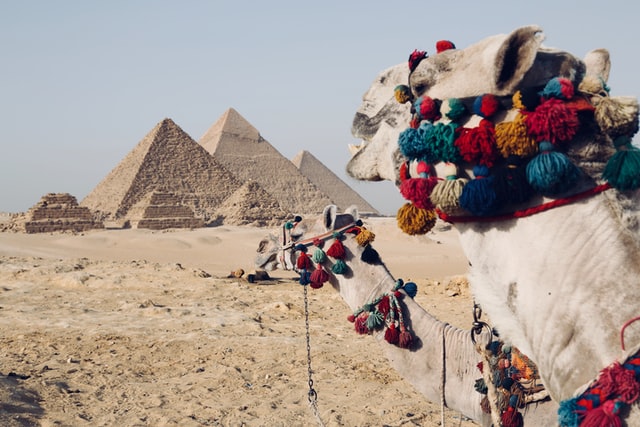Emergency Decisions: Living in Egypt During 9/11

“Give me a map and I will build you a city. Give me a pencil and I will draw you a room in South Cairo . . .”
– Michael Ondaatje The English Patient
It was so late that it was early, and I was sitting on a balcony watching a herd of camel marked for slaughter start a traffic jam down below in bustling Cairo, Egypt. War was on the horizon and there were decisions to be made.
While no one predicted the horrific events of September 11, 2001, the US State Department did issue Worldwide Caution messages in the days before the attacks. The advisory – which I still own (printed via dot matrix printer) – mentions Al Qaeda specifically. I was living in Egypt on that terrible day, Cairo to be precise. My Arabic was novice level at best and it took a few hours to find news reports in English. I saw a map of the United States with markings all over it. I feared much worse. It wasn’t long before a restaurant close to my dorm brought English language CNN up on their big screen so we could get the latest news. Egyptian friends came out of the woodwork to make us feel safe and comfortable. In many ways it was a good place to be on an awful day.
My experiences in 2001 shape my perspective on current events, which I watch with a sad heart. There are expatriates who are currently forced to make difficult decisions. Fifteen years ago, we were never instructed to “shelter in place” or even to pack bug-out bags. We were not confronted with the choices some people are making this instant in normally wonderful places like Bangladesh and Turkey.
How would someone traveling, living, working, or studying abroad face such enormity?
- Be grateful and gracious – Egyptians I barely knew offered their friendship, homes, or companionship just to make sure we felt comfortable. Egyptian hospitality is legendary.
- Don’t be flashy – I carry my DSLR camera in an old lunchbox.
- Avoid embassies. Embassies are among the first places demonstrators gather. Crowd mentality overrides common sense. Even if you agree with the protesters, avoid the area.
- Register with your embassy and sign up to receive notifications. They will issue advice when necessary: The US State Department has procedures in place for emergencies, as do many other Western governments.
- Communicate with family back home regularly. Boring statements are reassuring: “Spent three hours in the library mom.” “Making a lot of headway on my thesis, mom.” “Stayed out dancing until I saw the sunrise on the Nile”.
- Have a plan. Mine was to grab some documents I had handy and head to a friendly embassy (Canada or Mexico) if necessary. It was never necessary.
- Continue living. So many tourists cancelled their trips that at one point I found myself alone in the Temple of Karnak’s great hypostyle hall. It is normally packed with sightseers. I was sort of ecstatic.
- Know what you are willing to do for love. A friend of mine fell in love while working in Madagascar. Under evacuation, she had two hours to pack, find the love of her life, and say farewell. They weren’t sure what to do. It’s been 15 years and she still dreams about him. They live with regret. If you begin a relationship abroad check in with your own feelings regularly.
I was studying and researching for my Masters thesis at the time. Many of the new friends I had met packed up and left. Some made the decision while praying in a Coptic Church that opened its doors to strangers. Others made the decision over tea at Shepheard’s Hotel. Still others agreed to leave at the request of family back home. Leaving was the right decision for them.
With this turmoil around me I was relieved to find a moment and laugh heartily. Those camels stopping traffic made me giggle for the first time since the attacks. I knew while sitting on that balcony in South Cairo that my decision was to stay.
We who remained did so because we fell in love. We were infatuated with the art, the history, the expat lifestyle, the friends, the dust, the azhan (the call to prayer), the incessant noise, but most of all, with Egyptian generosity. I have never regretted the decision I made on that balcony when I probably should have been in my dorm studying. I was in love with a city.
Top image by Unsplash.







